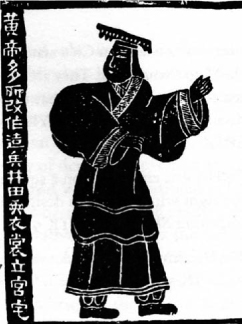East Asian Mythology: China and JapanThe Chinese Pantheon |
Who were the Five August Emperors? |
The Five August Emperors are an example of the tendency in Chinese mythology to unite history with myth and heroes with gods. Huang Di, Zhuanxu, Di Ku, Yao, and Shun are the names usually applied to the legendary first five kings of China, who are associated with the cardinal directions (North, South, East, West, and Center) and elements (metal, wood, water, fire, and earth). Huang Di (Xuanyuan) was the Yellow Emperor, the most important of the five and often seen as the supreme deity or the Thunder god. It was he who put down a serious rebellion—a “war in heaven”—led by Chiyou, a son of the god of war. As an example of the hero rather than deity archetype, Huang Di was conceived miraculously when his mother, Fupao, saw a bolt of lightning circling a star. The lightning apparently impregnated her and after twenty-five weeks she gave birth to Huang Di, who could talk almost at birth and who lived three hundred years. Zhuanxu (Gaoyang), the second August Emperor, was a descendant of Huang Di. It was he who ordered the separation of heaven and earth. He lived as a human for eight hundred years. Di Ku (Gaoxin) was the third of the August Emperors. He could speak his name at birth, and his favorite means of transportation was a dragon. One of Di Ku’s wives gave birth to eight sons in succession after she dreamed that she had swallowed the sun. Yao, one of these sons, was the next August Emperor. He is known for having ordered the stopping of the great flood. Another son was Qi, the founder of the Shang Dynasty. Qi’s birth was miraculous, too. His mother, Jiandi, became pregnant when she consumed a swallow’s egg. The fifth of the Five August Emperors was Shun (Yu Shun), who gave up his throne to the great demigod and hero, Yu.

Among the first five kings of China was the Yellow Emperor, who is often seen as the greatest, even becoming a supreme deity. (151 C.E. illustration.)
